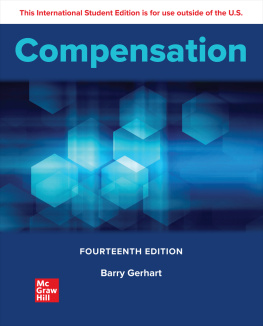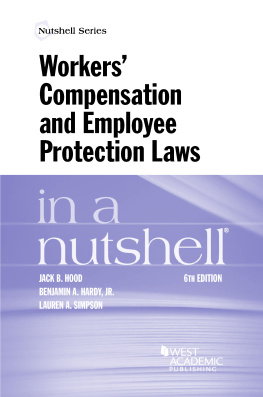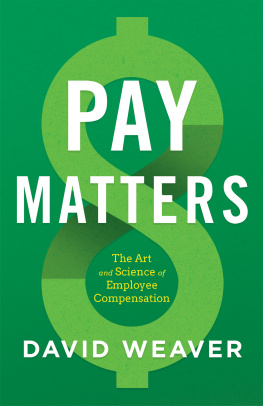Barry Gerhart - Compensation
Here you can read online Barry Gerhart - Compensation full text of the book (entire story) in english for free. Download pdf and epub, get meaning, cover and reviews about this ebook. City: New York, year: 2022, publisher: McGraw Hill, genre: Business. Description of the work, (preface) as well as reviews are available. Best literature library LitArk.com created for fans of good reading and offers a wide selection of genres:
Romance novel
Science fiction
Adventure
Detective
Science
History
Home and family
Prose
Art
Politics
Computer
Non-fiction
Religion
Business
Children
Humor
Choose a favorite category and find really read worthwhile books. Enjoy immersion in the world of imagination, feel the emotions of the characters or learn something new for yourself, make an fascinating discovery.
- Book:Compensation
- Author:
- Publisher:McGraw Hill
- Genre:
- Year:2022
- City:New York
- Rating:4 / 5
- Favourites:Add to favourites
- Your mark:
- 80
- 1
- 2
- 3
- 4
- 5
Compensation: summary, description and annotation
We offer to read an annotation, description, summary or preface (depends on what the author of the book "Compensation" wrote himself). If you haven't found the necessary information about the book — write in the comments, we will try to find it.
Compensation — read online for free the complete book (whole text) full work
Below is the text of the book, divided by pages. System saving the place of the last page read, allows you to conveniently read the book "Compensation" online for free, without having to search again every time where you left off. Put a bookmark, and you can go to the page where you finished reading at any time.
Font size:
Interval:
Bookmark:

page i
Compensation
Fourteenth Edition
Barry Gerhart
University of WisconsinMadison

page ii

COMPENSATION
Published by McGraw Hill LLC, 1325 Avenue of the Americas, New York, NY 10019. Copyright 2023 by McGraw Hill LLC. All rights reserved. Printed in the United States of America. No part of this publication may be reproduced or distributed in any form or by any means, or stored in a database or retrieval system, without the prior written consent of McGraw Hill LLC, including, but not limited to, in any network or other electronic storage or transmission, or broadcast for distance learning.
Some ancillaries, including electronic and print components, may not be available to customers outside the United States.
This book is printed on acid-free paper.
1 2 3 4 5 6 7 8 9 LCR 27 26 25 24 23 22
ISBN 978-1-265-07842-3
MHID 1-265-07842-4
Cover Image: De Space Studios/Shutterstock
All credits appearing on page or at the end of the book are considered to be an extension of the copyright page.
The Internet addresses listed in the text were accurate at the time of publication. The inclusion of a website does not indicate an endorsement by the authors or McGraw Hill LLC, and McGraw Hill LLC does not guarantee the accuracy of the information presented at these sites.
mheducation.com/highered
page iii
page iv
page v
page vi
page vii
page viii
page ix
page x
page xi
page xii

page xiii
About the Author
BARRY GERHART
Barry Gerhart is the Bruce R. Ellig Distinguished Chair in Pay and Organizational Effectiveness, School of Business, University of Wisconsin-Madison. Professor Gerhart received his B.S. in Psychology from Bowling Green State University and his Ph.D. in Industrial Relations from the University of Wisconsin-Madison. Professor Gerhart is a recipient of the Scholarly Achievement Award, the International Human Resource Management Scholarly Achievement Award (twice), the Herbert Heneman Jr. Career Achievement Award, and the Mahoney Mentoring Award, all from the Human Resources Division, Academy of Management. He has also received the Michael R. Losey Excellence in Human Resource Research Award, the career achievement award of the Society for Human Resource Management. Professor Gerhart is a Fellow of the Academy of Management and of the American Psychological Association. He has served as a department chair and/or area coordinator at Cornell, Vanderbilt, and Wisconsin, as well as senior associate dean and interim dean at Wisconsin. He has held visiting appointments at Bayreuth University, Kings College London, and Copenhagen Business School.
page xiv
Preface
Compensation is uniquely important in organizations because it typically represents the single largest operating cost, especially where employee skills or human capital are the source of competitive advantage (e.g., Google/Alphabet, Facebook; investment banking, law, accounting, and consulting firms; professional sports teams; universities). Compensation is also important because employees regularly report it as the most important factor that goes into their decision of whether to take a job or stay in a job. Compensation also plays a major role in what employees choose to do on the job: their effort level, where they direct their effort/what goals they pursue, how cooperative they are, how flexible they are, how ethical they are, and so forth. These all add up to determine how efficient, innovative, customer-oriented and (in the case of for-profit) how profitable an organization is over time. Profits, in turn, create jobs. In the absence of profits, jobs disappear. An organization that pays too much, pays too little, ties too much compensation up as fixed costs, and/or pays for the wrong things puts the company, its investors, and its employees at risk. On the other hand, designing and executing an effective compensation strategy can play a key role in great shared success.
Compensation challenges ebb and flow with changes in the economy. The Financial Crisis of 2008 and the related Great Recession brought job cuts (with the national unemployment rate rising to 10 percent, the highest since 1983), reduced hours, reduced employer contributions to 401(k) retirement plans, reduced bonus/profit-sharing payments, and some wage cuts. With revenue and profits down and with labor costs often the single largest operating cost, employers cut labor costs in these ways. Eventually, as company revenues picked up again, we gradually saw employers put less emphasis on cutting labor costs and more emphasis on hiring. However, job growth was initially quite modest. At the beginning of 2013, the unemployment rate was still at 8 percent. Why? Employers have become increasingly careful about adding new workers because they want to keep costs under control and they don't want to have to reduce the workforce if they guess wrong about increasing revenue growth/product demand (and the need for more workers). As economic growth continued, however, competition for employees increased and employers began to hire. The U.S. unemployment rate declined every year until it was below 4 percent in 2018 and 2019, the lowest it has been since 1969. However, wage gains remain modest. That is because employers are careful not only about hiring, as we have noted. They are also careful about giving wage/salary increases because once those are added to base pay, they are there forever. Increasingly, employers seek to make labor costs variable, which means greater reliance on bonuses and/or profit-sharing, where payments to employees go up during good times, but automatically go down during bad times when profits and revenues go down. Nevertheless, the low unemployment rates and the scarcity of workers it signaled resulted in a number of employers raising base wages.
Then, of course, the pandemic hit. The unemployment rate went from 3.5 percent in February 2020 to 14.8 percent by April 2020. Employers followed all of the same actions to cut labor costs in 2020 they had followed in response to the Great Recession that began in 2008. Suddenly, many employers went from having to raise wages to be able to hire and retain enough employees to run their businesses to instead having too many employees costing too much to survive without dramatic action. Business strategy became cut costs enough to survive, while being ready to go when business picks back up. A Conference Board survey reported that one quarter of employers laid off or furloughed employees and 34 percent reduced working hours. Some companies announced salary cuts (temporary) of 30 percent to 50 percent. Contributions to 401k plans were stopped at about 1 in 10 employers. The millions of workers who lost their jobs or who took pay cuts still had bills to pay. Government aid helped some business owners and employees, but not everyone and not always enough.
page xv
For some, there was opportunity. Amazons business strategy continued to be growth, and it added 427,300 employees (a more than 50 percent increase) between January and October of 2020. That this was necessary can be seen from the fact it grew its revenue from $87.4 billion in the quarter ending December 31, 2019 to $125.6 billion in the quarter ended December 31, 2020. Amazon paid many workers bonuses to work through the pandemic and remain with Amazon. There were some retailers who went beyond bonuses and raised wages to make sure they would have the workforce to respond to growth in business. In June 2020, Target announced it would increase its hourly minimum to $15, following increases to $11 in 2017 and $13 in 2019. The new hourly minimum allows Target to compete better for workers with Amazon and Costco, which had a $15 minimum hourly wage (Costco subsequently raised it to $16/hour in February 2021) and with Walmart, which also raised wages. By August 2020, many companies that had made temporary salary or benefits (usually 401k) cuts began to rescind them. Economic forecasts suddenly began to turn positive with the deployment of effective vaccines. In early 2021, The Congressional Budget Office (CBO) projected a rapid economic recovery to pre-pandemic levels by 2022, including a strong drop in the unemployment rate and thus a return to wide competition for employees. (Further, that projection did not consider the impact on economic growth of the $1.9 trillion American Rescue Plan Act of 2021 enacted in March 2021.) Things were about to go full circle, from economic boom until early 2020, to economic hard times (for most, not all) starting March 2020, and looking in the crystal ball (or using forecasts like that of CBO just above), employers need to shift back to recruiting (and retention) mode (and quickly) to be able to take advantage of the strong business recovery unfolding in 2021. (The unemployment rate was down to 6.0 % by April 2021.) Success in recruiting and retention will depend on competitive compensation. Not acting quickly enough or not setting compensation at a sufficiently competitive level means losing out on employees who choose to work elsewhere and thus losing out on sales and profits.
Next pageFont size:
Interval:
Bookmark:
Similar books «Compensation»
Look at similar books to Compensation. We have selected literature similar in name and meaning in the hope of providing readers with more options to find new, interesting, not yet read works.
Discussion, reviews of the book Compensation and just readers' own opinions. Leave your comments, write what you think about the work, its meaning or the main characters. Specify what exactly you liked and what you didn't like, and why you think so.








